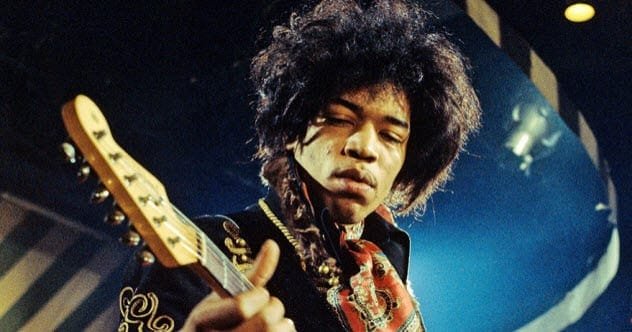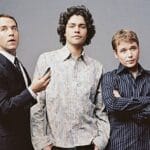Guitar solos have been a cornerstone of music, evolving from blues and jazz to rock and heavy metal. These instrumental breaks showcase a musician’s skill and add a powerful dynamic to a song. When executed perfectly, a guitar solo can elevate a track from good to legendary.
With countless guitar solos out there, creating a definitive list is subjective. This list highlights 10 noteworthy solos that remain influential and have profoundly impacted their respective genres and music in general.
10. Cult of Personality – Living Color, 1988 (Vernon Reid)
Living Color’s signature song, “Cult of Personality,” explodes with Vernon Reid’s unique guitar riff. Throughout the track, Reid teases the listener, holding back until he unleashes a dizzying solo before the final verse.
Reid’s jazz background shines in this blistering solo. While chaotic and almost bizarre, it remains grounded in the G major pentatonic scale, fitting the song’s overall musical arc. Reid’s improvisational skill is on full display as he explores the fretboard with frantic finesse, making each live performance unique.
9. Free Bird – Lynyrd Skynyrd, 1973 (Allen Collins and Gary Rossington)
The outro guitar work on Lynyrd Skynyrd’s “Free Bird” is a prime example of how a solo can transform a song. Collins and Rossington’s performance elevates the entire track to rock brilliance, making it one of the band’s most recognized songs.
Initially deemed too long for radio play at over 9 minutes, “Free Bird” features a dual solo born from a jam session. The uptempo, epic guitar solo takes center stage around the 4-minute mark, dominating the rest of the song. While the album version fades out, live performances could stretch to fifteen minutes.
8. La Villa Strangiato – Rush, 1981 (Alex Lifeson)
Rush, the Canadian progressive rock band, is celebrated for its lengthy, dynamic compositions. “La Villa Strangiato” epitomizes this, an instrumental track divided into 12 sections that tell a complete story without lyrics.
Alex Lifeson’s guitar work is central to this epic. Following a flamenco-style riff-laden solo, he intensifies with a spectacular display of slides, bends, and stops. Lifeson uses dramatic pauses alongside bursts of speed to enhance the musical effect, making him a musical pioneer and one of history’s most underrated guitarists.
7. Voodoo Child (Slight Return) – Jimi Hendrix, 1968
Jimi Hendrix is synonymous with psychedelic rock and unparalleled guitar mastery. From “Purple Haze” to his rendition of “All Along the Watchtower,” Hendrix’s genius shines, but his work on “Voodoo Child (Slight Return)” is perhaps his most impressive.
The track’s signature riff launches into an unforgettable opening solo. Hendrix’s use of the wah-wah pedal and guitar feedback adds depth to this audacious solo. “Voodoo Child (Slight Return)” was his only single to reach number one and the last song he performed live before his passing.
6. Mr. Crowley – Ozzy Osbourne, 1980 (Randy Rhodes)
Ozzy Osbourne’s debut solo album, The Blizzard of Oz, owes much of its success to Randy Rhodes. Rhodes’s lead guitar work formed the backbone of Ozzy’s solo career.
While “Crazy Train” features one of the most recognizable guitar riffs ever, Rhodes’s performance on “Mr. Crowley” is his greatest achievement. The slow tempo gives way to a lightning display of shredding, repeated in the outro. Despite his early death at 25, Rhodes is consistently ranked among the greatest guitarists of all time.
5. Crossroads – Cream, 1966 (Eric Clapton)
Eric Clapton, known as ‘Slowhand,’ delivers anything but a slow performance on Cream’s 1966 rendition of Robert Johnson’s “Crossroads.”
Based on the standard blues chord progression, Clapton infuses his typical guitar flourishes and delivers two mind-blowing solos. Clapton himself admits that his solo work on “Crossroads” is off-beat, humorously acknowledging its imperfections.
4. Comfortably Numb – Pink Floyd, 1980 (David Gilmour)
Pink Floyd’s “Comfortably Numb” takes listeners on a musical journey, described by David Gilmour as a battle between dark and light. This contrast is evident in Gilmour’s vocals and Roger Waters’ chorus.
Gilmour’s outstanding solo brings the song to an emotive climax, marrying conflicting styles in a breathtaking display. Despite the era’s focus on guitar solos, Gilmour’s work remains a defining piece of guitar genius.
3. Stairway to Heaven – Led Zeppelin, 1971 (Jimmy Page)
“Stairway to Heaven,” one of the greatest rock songs ever, wasn’t released as a single until 2007. It remains the most played song in radio history, despite controversies and initial skepticism.
The song builds from a gentle opening to Jimmy Page’s epic solo. The crashing drumbeat and vocal crescendo combine with Page’s fretboard prowess to create a memorable moment in rock music history.
2. Eruption – Eddie Van Halen, 1978
Eddie Van Halen’s death in 2020 marked the loss of a transformative musician. EVH revolutionized guitar playing through innovation, reworking equipment and pioneering finger-tapping.
“Eruption,” an instrumental track less than two minutes long, began as a warmup. It has become the pinnacle of guitar soloing, featuring lightning-fast fretwork and distinctive overdrive. It remains the holy grail of guitar mastery.
1. Anesthesia (Pulling Teeth) – Metallica, 1983 (Cliff Burton)
Iconic solos often spotlight lead guitar, but Cliff Burton’s bass solo in “Anesthesia (Pulling Teeth)” stands out. This track appeared on Metallica’s debut album, showcasing Burton’s profound influence.
Burton says, “Bass solo, take one,” before his iconic performance. While technically a Metallica song, it’s dominated by Cliff’s bass, with Lars Ulrich adding drumming halfway. Burton makes the bass sound better than its six-string counterpart, solidifying his legacy.
These iconic guitar solos have left an indelible mark on music history, influencing generations of musicians and fans. From blues-inspired riffs to groundbreaking innovations, these solos have elevated songs and transformed genres.
What are your favorite guitar solos? Share your thoughts in the comments below!










